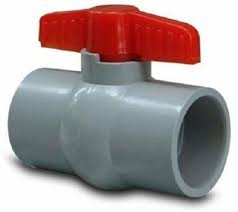
PVC Ball Valve: The Durable Choice for Fluid Control
Flow control is an essential element in many industries. A device that plays a significant role in flow control is the ball valve. It is a mechanical component designed to allow or prevent the flow of liquid, gas, or steam through pipes and pipelines. In this article, we will explore ball valves, including their design, types, and applications.
PVC ball valve feature a round closure unit that sits inside a spherical valve shell. The ball has a bore hole that aligns with the pipe opening and the flow direction. Turning the lever or handle a quarter turn rotates the ball, either allowing or obstructing media flow through the pipeline. Most ball valves allow full or partial opening, providing maximum control over the flow rate. The spherical design of the valve ensures tight sealing when the valve is closed, preventing leaks.
There are several types of ball valves available in the market. The most common is the floating ball valve. It has a small bushing that supports the ball and allows it to move freely. The trunnion ball valve has additional mechanical anchoring at the top and bottom of the ball to withstand high-pressure applications. The V-port ball valve has a V-shaped ball that moves in a cone to regulate the flow rate. Finally, the three-way ball valve features three ports and resembles a T-junction fitting. It can mix or divert fluids as required.
Ball valves have a wide range of applications in different industries, including oil and gas, chemical, water treatment, and HVAC. They are ideal for controlling flow rates in applications where precise control is essential. For instance, in oil and gas applications, ball valves can be used to control the flow of crude oil, natural gas, or water. They can also be used in chemical plants to isolate toxic fluids, or in water treatment plants to regulate the flow of treated water.
Ball valves are easy to install and maintain. They have a simple design, and their durability is exceptional. Most ball valves are constructed using durable, corrosion-resistant materials, such as stainless steel, brass, or PVC. However, regular inspection, lubrication, and cleaning are necessary to ensure optimal performance and prevent potential issues like clogging or seal deterioration.
In short:
Ball valves are a popular flow control component in many industries. Their design, construction, and application make them ideal for precise control of fluid flow rates. The various types of ball valves available allow for versatile use in different industries, including oil and gas, chemical, water treatment, and HVAC. Proper installation, regular maintenance, and cleaning are crucial to maximizing ball valve performance and ensuring long-term durability. If you are looking for flow control devices with high durability, optimal performance, and precision control, ball valves are an excellent option.



